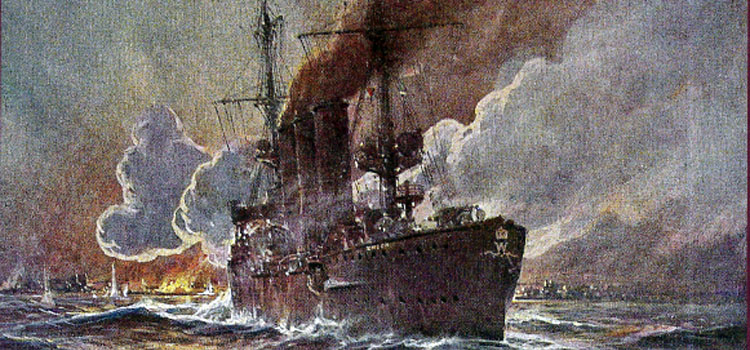
The Sms Emden steams away after shelling Chennai 22-23 September 1914 - Source CAFHR-United Service Institution of India
While World War I is seen as largely bypassing the Indian mainland, there is one abiding memory that Chennai (then Madras) carries on when the war came to its shores. On September 22, 1914, exactly a month after what is now celebrated as Madras Day, the city became the only Indian one to face an assault by Germany and its allies – Hungary, Austria, the Ottoman Empire and Bulgaria.
The daring raid by a German ship, the SMS Emden, contributed to two enduring legacies to Chennai – in addition to the Tamil lexicon for unsurpassed bravery, and the continuing mythography of Chempakaraman Pillai, as an Indian patriot who (like Subhash Chandra Bose during World War II) hoped to exploit international balances of power to aid India’s struggle against the British.
On the night of September 22, the Emden, captained by Karl von Muller, managed to weave its way past a massive fleet of the British Navy in the Bay of Bengal and the Indian Ocean sailed into Madras Harbour to attack a number of harbour installations and destroy nearly 350,000 gallons of oil stored by the Burmah Oil Company.
The Emden rained nearly 130 shells on the harbour, not only destroying two of the giant fuel storage tanks and badly damaging the other two, but also destroyed two ships, damaged two others, damaged buildings of the General Post Office, the Port Trust, and the Madras Sailing Club among others, and a number of key roads around the harbour front.
While some historians still puzzle over the mystery of why the Emden didn’t press its attack further to more thoroughly damaging Madras, there is no question that the September 22 attack did enough damage to the city to leave its mark forever. With its many successful attacks on merchant and military ships all across the Indian Ocean up to Indonesia, the Emden established itself as an example of unmatchable daring. To this day, a bold soul who’s ready to face any challenge is referred to as “an Emden” in Tamil parlance in Chennai.
A key part of the legend around the SMS Emden is also the role of Chempakaraman Pillai. While the narrative has been challenged by historians, there is a claim that Chempakaraman was aboard the Emden and helped coordinate the attack on the Madras Harbour.
Whether or not Chempakaraman’s role in the Emden attack can be proven, there is enough documentation to show that the young revolutionary was part of an effort to enlist German aid against the British presence in India. This effort even gave rise to a short-lived provisional government of India in Kabul in 1915, though this effort eventually failed and its participants fell victim to backlash from the British Empire.
According to some sources, Chempakaraman may have even had a role to play in SC Bose’s plans to form an Indian National Army and mobilise support against the British in World War II.
In 2008, a memorial to Chempakaraman, the man who may have helped bomb Madras, was unveiled at the Gandhi Mandapam in Adyar, by the then Chief Minister M Karunanidhi.
Source: The News Minute